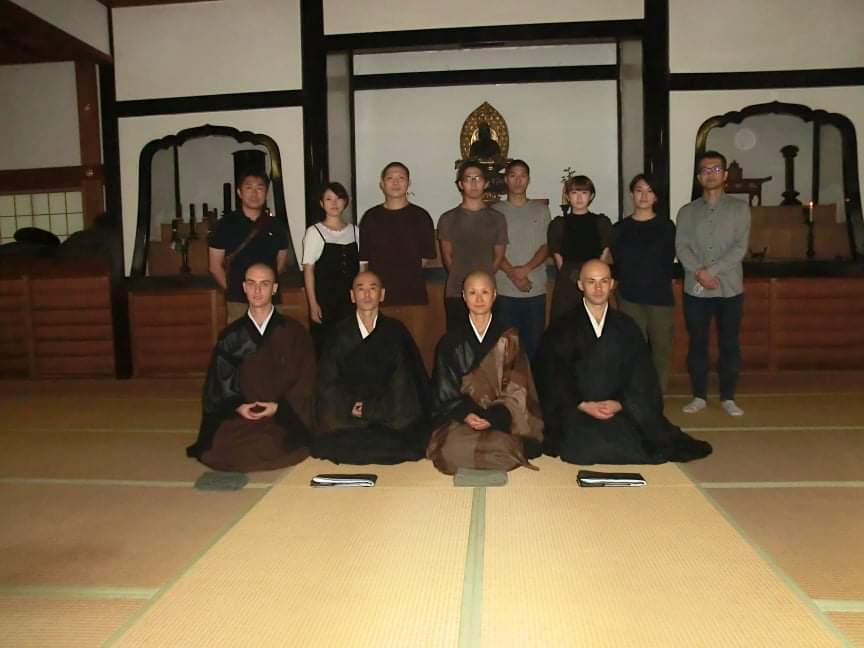Memento mori
I have been in Antaiji for almost two years. A lot has happened, and at the same time nothing has really changed. Now, as I write these lines, the rain is falling gently on the fallen leaves, Hikaru is checking the baking of a cake, Icchu-san is reading his notes about winter vegetables. Soon the snow will fall.
This year, I became a monk. Perhaps precisely so as not to forget that nothing fundamentally changes, even if everything is always different and fresh. There will still be autumns and fallen leaves, there is no point to worry about. Of course, we have to think about next year, the amount of wood, the rice fields and the miso. But there’s no point struggling with it. Perhaps this is a lesson I learned this year during takuhatsu: there is no point in worrying, relying on the world is enough. You may or may not receive money, sing vigorously or not, ultimately the best is always yet to come. You don’t sing to receive, you express a form of gratitude. In the same way, when we do zazen, for at least an hour, we can “just be”. To live is enough, to practice is enough. Do not worry. Simply express gratitude.
I have been asked a lot why I have decided to become a monk, and, what makes the difference between a monk and a layman. There are obviously many academic answers to this question, but ultimately, as far as I’m concerned, I think that to be a monk is to walk a little more on this path of gratitude. When I lived in Kyoto, I could hear my neighbor, an old grandmother, reciting the hannya shingyo. Each morning. Then she went to the nearest Shinto shrine, located at the entrance to the Philosophy Path. Not to ask the kami for something, but to say “thank you”. If you have any illness, you must thank the kami for it. If you have any problems in your job or your loved ones are having a difficult time, you should still thank the kami for it. Reciting the sutras, going to the shrine, it is just a story of gratitude. Whether this approach is “Zen” or not is not very important, but I think it’s a central point of Buddhism. When my French friends ask me for a definition of Japanese Buddhism, I often tell this anecdote. The number of hours of zazen, the period of time and the name of the temple where you practiced, the masters that you know or the spiritual experiences that you have been able to have, it doesn’t matter any more to me. There will always be people to be attached to opinions, to believe that there is a “Zen attitude” to have, to be solemn when they speak of Zen, believing to “educate” “others” about the “Truth”.
In 1957, the French writer Louis-Ferdinand Céline said in an interview something like this: “I see mainly people who drink, who eat, who sleep … who take care of all the human functions, which are all quite vulgar , and … I will say they are heavy, their mind is heavy, that’s what seems to me mostly … It has always been heavy […] There’s very little lightness in mankind, they are heavy, and nowdays they are extraordinarily heavy, since the cars, alcohol, ambition, politics make them heavy, heavier, one day we may see a revolt of the spirit against … weight, but it’s not for tomorrow, for now … we are heavy. We activate, we increase the weight. Instead of becoming lighter ”. To have the spirit of gratitude is to become lighter, more aerial, and for sure not to forget that life is a great and aesthetic irony. In a certain way, Antai-ji is also a joke.
There will always be people to judge your practice, to assess your attitude. Have you put your things in order? Did you prepare the meal well? Are you trying hard enough to be “here and now”? Judgment is everywhere. Whether or not he is motivated by a feeling of benevolence, you will be judged. Sometimes people will say good things about you. Sometimes no. In a way, this is something necessary. People who have been in a great temple like Eihei-ji will have an aura of merit around them, and those who practice as a layman will always have something to prove. There will always be someone there to complain, which, probably, is also inevitable. It is not specific to Antai-ji, it is a universal thing. And if no one wants to be judged on him, it is also not interesting to be the person who judges. The question behind it all is: is there still a place for gratitude in your life, now? Are you a person who seeks to be more efficient, better performing, fairer, stronger, more experienced, or someone whose attitude expresses a deep sense of thankfulness towards the beauty of the things around us? To wear the kesa is for me, at least, to express this gratitude, to fade into something greater. I imagine that writing the kechimyaku yourself is a part of this: you express your gratitude to the ancestors, you become aware of the insignificance of your name. It is also realizing that there is no hope to have. The temple, in the end, is my life: of course samu or zazen, but in a broader way, work, bills or taxes, housework, ordinary human relations, the temple it is all of this. The thousand arms of Kannon are the thousand actions in your day. The relics of the Buddha, our bones. The pagoda, your body. And it is towards all of this that I want to continue to do gassho.





